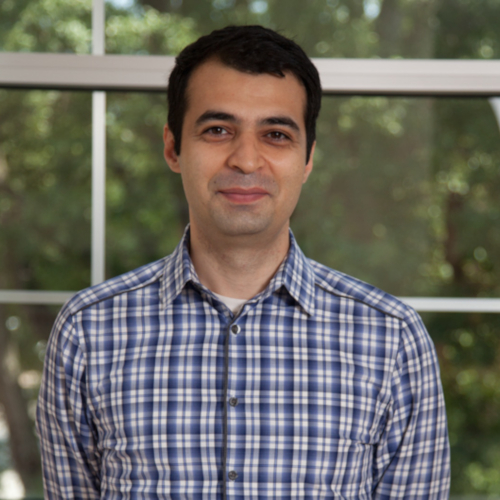Behnam Kia

Bio
Behnam Kia received his Ph.D. in Electrical Engineering from Arizona State University in 2011. After graduation, Behnam joined University of Hawaii’s physics department as a researcher and a faculty member. In 2015 Behnam has moved to North Carolina State University and he has been a research assistant professor at the Physics department and Electrical and Computer Engineering department.
Behnam Kia’s research work has been published in over 30 peer-reviewed journal papers, and in addition, 8 patents have been filed based on his research work. He is a Co-Principal Investigator in the Chaos Computing STTR project, where he and his collaborators are fabricating and commercializing Chaos Computing applications. Behnam is a member of IEEE and American Physical Society.
Area(s) of Expertise
My research focuses on Chaotic and Stochastic Computing. I work on theoretical aspects of these approaches, as well as the application and implementation sides of the theory. Signal processing and machine learning are the main application fields that I usually target.
Here is a listing of current and recent specific projects:
Chaos-Based Adaptive, Reconfigurable Hardware: A chaotic dynamical system possesses a very rich, complex library of behaviors. It is believed that natural and biological systems utilize their intrinsic nonlinearity in order to exhibit different behaviors and adapt to different environmental conditions. We follow this natural approach, and design and fabricate chaotic integrated circuits that can morph and adapt to different conditions.
Chaos-based hardware for near sensor processing: In many applications, we cannot simply upload the sensor data to the cloud for processing, instead the sensed data should be processed locally, close to the sensor, and then the information, knowledge, or even the required reaction should be sent to the cloud instead. This trend, also known as edge computing, is becoming more popular as billions of IoT nodes are deployed, or about to be deployed in near future, and uploading the raw data from these billions of sensors to the cloud is neither scalable and sustainable, nor secure. We design chaos-based and stochastic-based hardware that can directly connect to the sensors and receive analog inputs, convert them to digital data, and locally process them with minimal power.
AI accelerator based on stochastic and chaotic computing: Deep learning techniques involve deep neural networks with millions of nodes and parameters, and therefore each inference action requires millions of multiplications and additions. As a result, there is a need for custom hardware for deep learning, where the hardware can implement deep learning techniques quickly, using a less power. We design chaos-based and stochastic based accelerators for this purpose.
Chaos-based Bot: A chaotic system contains infinitely many different behaviors, which can provide us with a solution space for a given problem. Therefore by training a chaotic system and taming its chaos, we can evolve its behavior to choose and settle into a solution that provides an optimal solution for the given problem. Following this idea, we have designed a chaotic Bot that is under training for responding to incoming messages. The front end of this Bot is implemented through Twitter. You can tweet at this Bot, and it tweets back at you. The back-end of the Bot is a chaotic engine. The message is fed to this chaotic dynamical system as an input parameter (we use ASCII coding to transfer text to numbers readable by the dynamical system, and then numbers back to the outgoing text.) The state of the chaotic dynamical system at each moment is a function of and determined by the messages it has received in the past, therefore it has a memory. The back-end and the training part is still under modification and construction, but you can still tweet at this chaotic bot and receive the reply that the chaotic engine produces. Please see instructions at: https://twitter.com/newbie_at_NAIL
Teaching
Fall 2018. PY 599: "Applied Artificial Intelligence"
This is a hands-on course. Each student during the class will be provided with a laptop with all necessary tools and software installed. During this course foundations of artificial intelligence, machine learning, and deep learning will be introduced through working on different examples and projects. This course is open to students from all departments.
- Instructor: Dr. Behnam Kia
- Location: Cox 105 (College of Sciences Interactive Learning Classroom)
- Time: Fall 2018, Tuesday and Thursday 3:00PM-4:15PM.
- Credits: 3 (Good for both undergrads and grads).
- Prerequisites:
- Linear Algebra (A working understanding can suffice).
- Probability Theory (A basic understanding can be enough).
- Basic Programming Skills.
- Calculus.
Please feel free to email me if you have any questions or need additional information: bkia@ncsu.edu